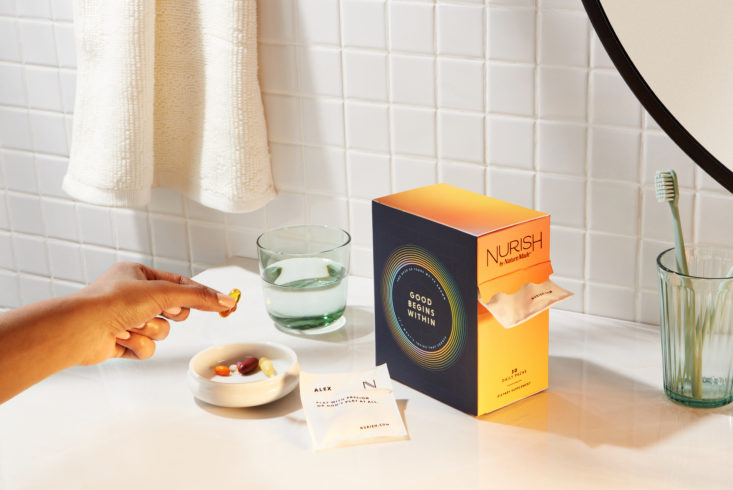
Nurish by Nature Made® has a new deal available for new subscribers.
This personalized monthly supplement subscription plan delivers daily packs of vitamins and minerals for your unique nutritional needs.
Take an easy five-minute quiz to determine what supplements are right for you, choose your vitamins and they’ll be shipped to your door. Packs are easy to adjust and can change as your health needs do.
There’s a 30-day satisfaction guarantee, so you can try Nurish risk-free.
Have questions about starting a vitamin regimen? The experts at Nurish have answers. Read on to learn a little more about incorporating supplements into your life.

How important are vitamins in a daily routine?
Nutrients are vital to our health and well-being. They are the building blocks of our cells and drive the functions of our body 24/7. It is important to meet our daily nutrient needs but that is not always easy to do. Nine out of 10 Americans don’t consume adequate amounts of nutrients from food alone. Dietary supplements can help fill the gaps of these critical nutrients, but one of the largest factors of getting the full benefits of vitamins is consistency. One large multivitamin study showed it can help decrease nutrient deficiencies in as little as three weeks, but taking it daily was key!
Does it matter what time of day you take your vitamins?
It doesn’t matter what time of the day you take your supplements – it is what is most convenient for you. The one thing that does matter is to always take them with food. Nutrients are best absorbed with food and it also decreases the chances of stomach upset you may get when taking vitamins on an empty stomach. Learn more about the best time to take supplements here.
What vitamins should young women seek out?
New research by the scientists at Nature Made found younger women had the highest nutrient inadequacies of any other life stage! Younger women had substantial nutrient shortfalls in the following nutrients:
| Percent of women not meeting nutrient needs from diet | ||
| 15–30 years | 31–44 years | |
| Vitamin A | 50% | 44% |
| Vitamin C | 47 | 46 |
| Vitamin D | >97% | >97% |
| Vitamin E | 92% | 88% |
| Calcium | 49% | 44% |
| Magnesium | 62% | 44% |
Study: Devarshi, PP, et al. Total estimated usual nutrient intake and nutrient status biomarkers in women of childbearing age and women of menopausal age, The American Journal of Clinical Nutrition, Volume 113, Issue 4, April 2021
For more information about a women's nutrient needs, click here.
Should you be changing your supplements based on your diet or exercise habits?
It’s a good idea to pay attention to any changes in your routine or eating habits that could impact your nutrient needs. Changes in your diet could mean your nutrient needs increase or decrease. If you decrease your intake of dairy products, you may benefit from a calcium supplement, or if you increase your intake of fruits and vegetables, you may no longer have a vitamin C gap. Nutrient needs can change through the season as well. You may have received enough vitamin D in the summer but may benefit from a vitamin D supplement as winter approaches. Your nutrient needs may not change with exercise habits, but it’s always a good idea you are getting enough vitamin D and magnesium in your diet to support muscle health. For more information, click here.





Please do not enter your email address in the Name field or in the comment content. Your email address will not be published. Required fields are marked *. Remember to post with kindness and respect. Comments with offensive language, cruelness to others, etc will not be approved. See our full comment policy here.